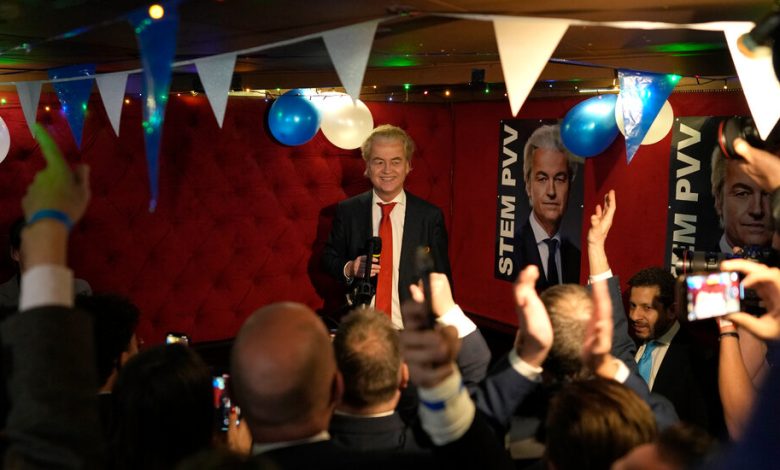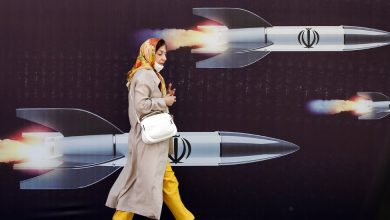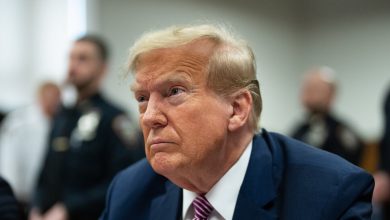Far-Right Icon Predicted to Win Dutch Elections

The Netherlands on Wednesday took a startling turn in national elections with the potential to ripple through Europe, as Dutch voters threw most support behind the party of a far-right icon with an incendiary reputation who had campaigned on an anti-immigrant platform.
Geert Wilders, a political provocateur long known for his anti-Islam and anti-Europe stances, appeared poised to come out significantly ahead with the most parliamentary seats, according to exit polls, which were expected to be dependable, especially given the margin of victory they indicated.
“The Dutch voter has spoken,” Mr. Wilders said in a speech on Wednesday night, declaring himself the winner. “The voter has said, ‘We are fed up.’” He added that he wanted to return “the Netherlands to the Dutch.”
If preliminary results hold up, the Netherlands will be at the threshold of uncertain new political terrain after 13 years of stewardship by Prime Minister Mark Rutte, a stalwart of Dutch politics and a dependable presence on the E.U. stage.
Mr. Rutte had helped the small European nation punch above its weight in the European Union, especially after the British exit, as he advanced an agenda of rules-based free trade and commerce, fiscal prudence and liberal social values.
Mr. Wilders, on the other hand, has argued for a Dutch exit from the bloc, in addition to promoting positions so extreme — such as ending immigration from Muslim counties, taxing head scarves and banning the Quran — that he requires a security detail.
“The Netherlands will be tougher and more conservative in Europe,” including on budgets and migration, said Simon Otjes, an assistant professor who teaches Dutch politics at Leiden University.
But the Dutch position in the European Union did not feature prominently in the campaign, Mr. Otjes said, and he predicted that an actual Dutch exit from the bloc was unlikely, because a majority of lawmakers would not support it.
A victory for Mr. Wilders would lengthen a string of advances for far-right parties in northern Europe, including Sweden, where the government now depends on the parliamentary votes of a party with neo-Nazi roots, and Finland, where the right has ascended into the governing coalition.
The elections came two years ahead of schedule after Mr. Rutte’s governing coalition collapsed over disputes over immigration policy in July. Early indicators gave Mr. Wilders’s Party for Freedom 35 seats in the 150-seat Parliament, so even if it comes out on top it will be necessary for it to partner with other parties.
Forging a coalition could take weeks or months of haggling and its shape is far from clear, but it now seems certain to test the tolerance of the Netherlands’ mainstream parties for dealing with a politician they have often ostracized.
On Wednesday, Mr. Wilders addressed other parties in a speech, saying that as the biggest political party of the Netherlands, his party could no longer be ignored and imploring them to work together.
The election outcome left the Dutch political establishment dismayed.
“For us this result is a disappointment,” Dilan Yesilgoz-Zegerius, the lead candidate of the People’s Party for Freedom and Democracy, said in a short speech on Wednesday night. She added that her party had not listened well enough to voters.
As voting neared, Mr. Wilders seemed to have moderated his stances against Islam. Last week, he told a Dutch television show that he was willing to make concessions on his anti-Islam policies, saying that “there are more important priorities.” The change of tone seemed to have worked in softening up voters.
The election was one of the most competitive and unpredictable in the country’s recent past, with four of the country’s largest parties jockeying until the very last minute.
A coalition between the Green Party and the Labor Party had the second-strongest showing, with an estimated 25 seats. The Green-Labor coalition, led by Frans Timmermans, a former European Union climate czar, has said it will not govern with Mr. Wilders’s party.
Pieter Omtzigt, the man who dominated the campaign and served as its chief protagonist, won 20 seats, less than some early polls had indicated. His party, New Social Contract, was formed in August and had seemed to be drawing protest votes from left and right in a country where voters had grown disillusioned with their political leadership after Mr. Rutte’s government was hobbled by several scandals.
Instead, it appeared, the disaffected sought a more dramatic change than usual and gravitated toward Mr. Wilders, delivering a relative landslide for the far right for the first time in a national election for the House of Representatives.
In July, Mr. Rutte announced that he would leave Dutch politics entirely after his government collapsed because it failed to agree on migration policy. He will stay on as caretaker prime minister until a new government is formed.
It was long hard to imagine the country under a different leader, and for much of his tenure Mr. Rutte had the reputation of a sober leader while populists sprouted up in other countries. Nicknamed “Teflon Mark,” he seemed to survive any scandals his government faced.
Because of a scandal in which Mr. Rutte’s government failed to protect thousands of families from overzealous tax inspectors, his government resigned in early 2021. But he was easily re-elected in the national vote that followed.
The elections had been hard to predict until the last minute. With the new players and the creation of a brand-new party, the atmosphere of this election cycle had been more intense and unpredictable than in prior years, voters said, especially after more than a decade of little to no change in leadership.
“I find it very exciting,” said Katja Henneveld on Wednesday, after casting her vote in Amsterdam. “I’m nervous.”
The climate and a lack of housing in the country ranked among the most important issues in this campaign for her, she said.
For Marieke Schunselaar, a 24-year-old voter, climate was also the biggest issue this campaign. She also said that she was surprised by a seeming rise of populist parties — such as Mr. Wilders’s Party for Freedom and the Farmer Citizen Movement, which swept regional elections this year, something she called a “worry for many young voters.”



